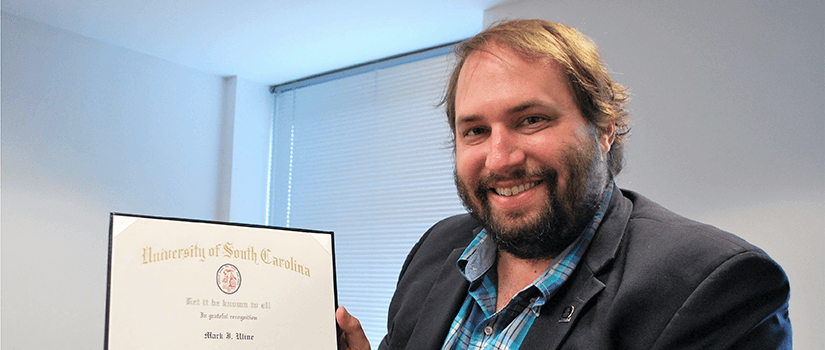By Samantha Winn | June 13, 2019
Looking back to his undergraduate years as a chemical engineering student at Purdue University, Mark Uline was among 600 students with the same advisor. Now, as the undergraduate director of biomedical engineering at the University of South Carolina and the 2019 recipient of the Ada B. Thomas Outstanding Advisor Award, he decided to change the very process that led him to his career.
Biomedical engineering is the third largest undergraduate population at the College of Engineering and Computing and with the sheer size of the program, student advising didn’t promote the personal faculty-student connections that he wanted.
“Initially for me, you had these pages on your door with a schedule calendar where students would come in and sign up,” Uline says. “For us it was almost impossible because we had 50 to 60 students assigned to each person. It was just untenable.”
This problem led Uline to find a solution. Starting back in 2013, he helped propose the new system of block advisement, which gave students the opportunity be advised by a faculty member of their choice. and often, several faculty members as a team. This type of advisement can help spark the beginning of faculty-student relationships.
“The students can get lots of different input because they sit there, and they are actually sitting across from one to three different faculty members and they get all of this different advice at once,” Uline says. “And it really worked well, and I think that’s a major part of me winning the award was having this kind of new thing that we started in biomedical engineering.”
Under this new system, students and faculty alike have a chance to get motivated about specific courses of studies.
“Seeing other faculty being passionate about it helps other people become more passionate about it,” Uline continues. “Not necessarily the thing that they are most looking forward to every semester, but they are starting to see more of the positive benefit that it has.”
In part with the changes Uline made to student advising, which the Ada B. Thomas award recognizes faculty for, his philosophy also helped him in being a mentor to students and bringing shared success.
“I think it’s really important to take advice from people that have a lot of skin in the game that have some attachment to you being successful,” Uline says. “People that realize that advising our students is really important for us and they are our product that we put out into the world. Their success is our success.”
Uline practices what he preaches while mentoring Honors College students with an interest in biomedical engineering. One of his mentee’s and research assistants, Rachel Haupt, is a biomedical engineering major currently conducting research through an internship at Johns Hopkins University. She went to Uline for advice during the application process.
“He just said, ‘What’s the worst that can happen? Just go ahead and apply for it. The worst that’s going to happen is they say no but at least you will have tried,’” Haupt says. “And actually, I am currently at that internship.”
Mary Kramer, another mentee and research assistant, echoes similar sentiments as Haupt. She is currently conducting research at the University of Illinois this summer and credits Uline with helping her in her decision-making processes regarding her career.
“It’s one thing to have an upperclassman or a grad student that has been through what you have been through, but they haven’t come out on the other side,” Kramer says. “But Dr. Uline he’s been through it, come out on the other side, and is a very successful, very intelligent person. He has really helped me make so many of the decisions I have made and his advice is so invaluable.”
Uline hopes to have taught students how to think independently, instead of just teaching course material and skills. The results are apparent.
He says, “I think that we have a first-class research program in CEC, but we really do care about the undergraduates and what they learn and how they learn and that they are successful and that sets us apart.”
